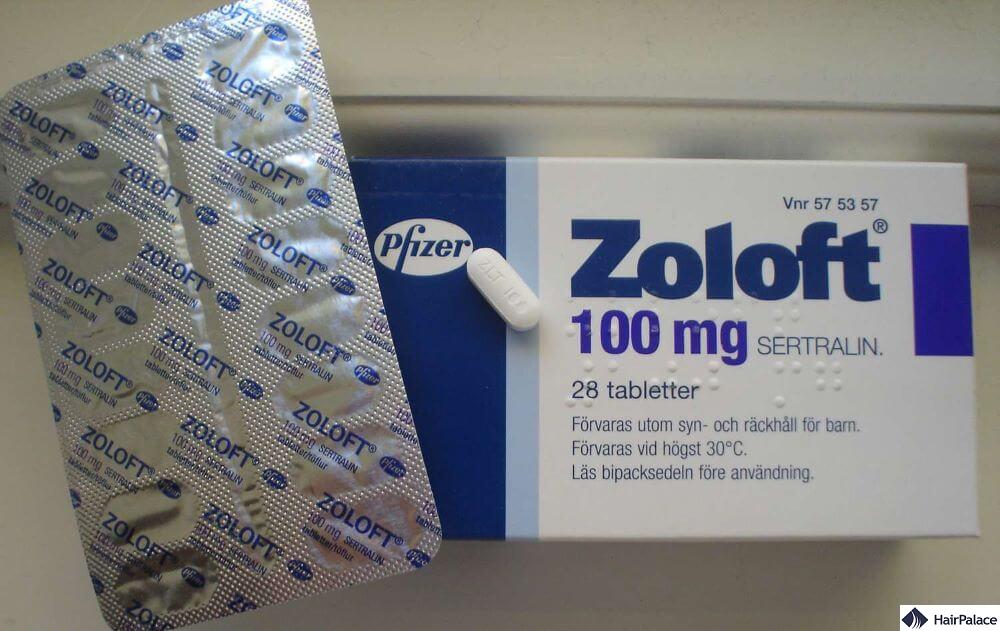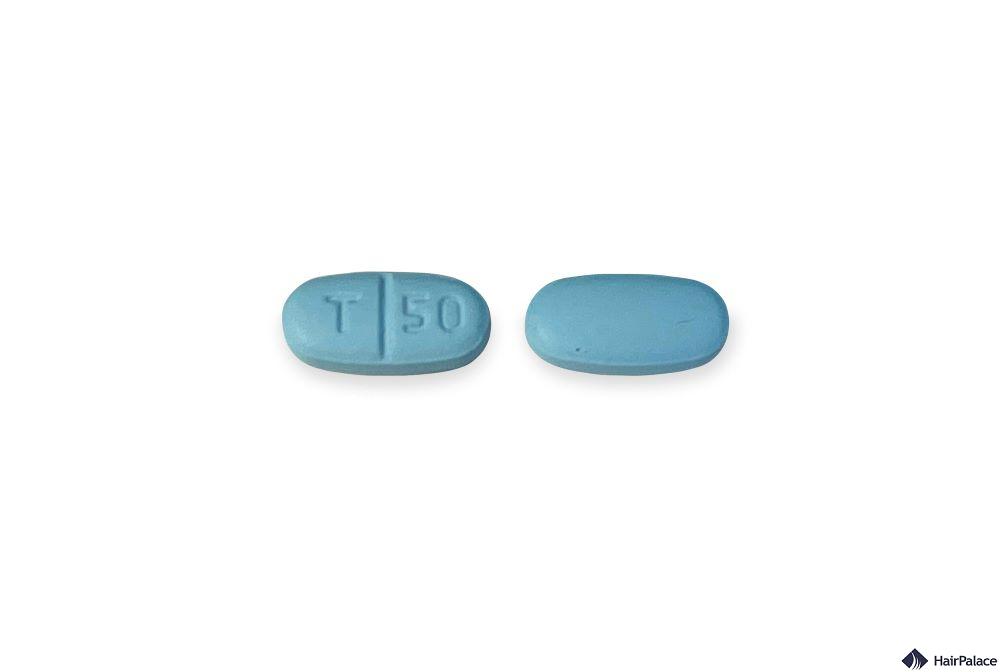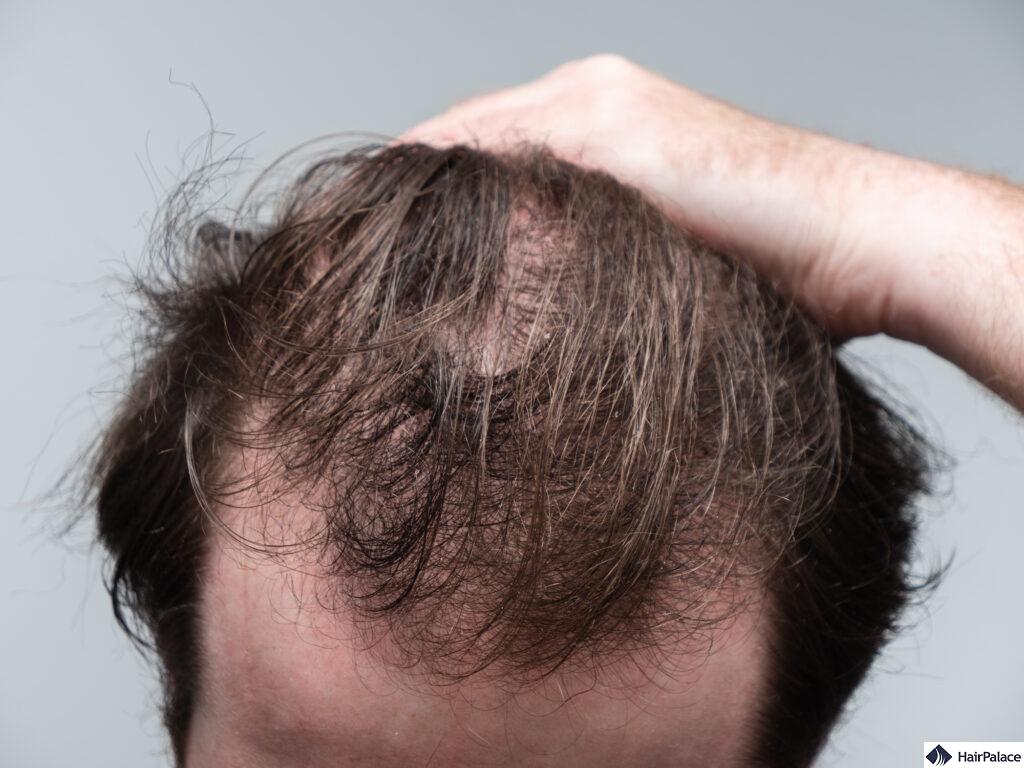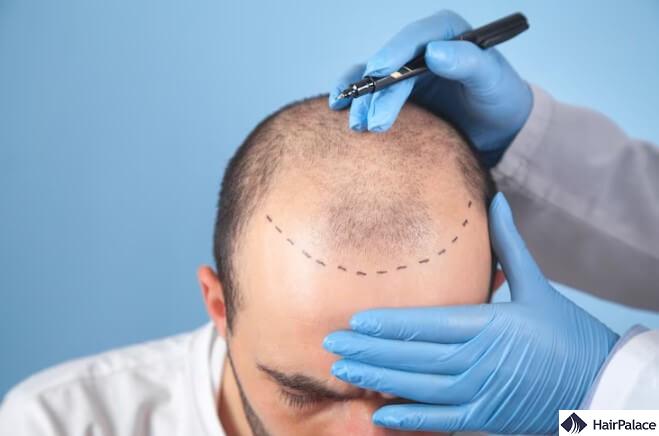Sertraline Hair Loss: What is The Truth?

Sertraline is one of the most commonly prescribed antidepressants worldwide, helping millions manage depression, anxiety, OCD, and more.
But for some, starting sertraline brings an unexpected worry: hair loss.
Is there a link between sertraline and thinning hair, or is it just a coincidence?
In this article, we explore the research findings, understand why hair loss may occur, and provide guidance on what to do if you notice hair shedding while taking sertraline.
- What is sertraline?
- Sertraline side effects
- Does sertraline cause hair loss?
- What is antidepressant induced hair loss caused by?
- What other antidepressants cause hair loss?
- Is sertraline hair loss reversible?
- How to treat hair loss caused by antidepressants
What is sertraline?

Sertraline belongs to a class of antidepressants called selective serotonin reuptake inhibitors (SSRIs).
Sertraline treatment is most commonly used to treat depression and anxiety disorders.
These include generalised anxiety disorder, social anxiety, and panic disorder.
It’s also prescribed for obsessive-compulsive disorder (OCD), post-traumatic stress disorder (PTSD), and premenstrual dysphoric disorder (PMDD).
Sertraline works by increasing serotonin levels in the brain, which helps improve mood and reduce anxiety.
It’s sold under brand names like Zoloft, and it typically takes several weeks of consistent use to feel its full effects.
Sertraline side effects (hair loss)

Sertraline can cause side effects, though many people tolerate it well without active hair loss or other symptoms.
Common side effects include:
- Gastrointestinal issues: nausea, diarrhoea, dry mouth, indigestion
- Neurological effects: dizziness, headache, drowsiness, insomnia, tremor
- Sexual side effects: reduced libido, delayed orgasm, erectile dysfunction
- Other: sweating, weight changes, fatigue
Less common but serious side effects can include serotonin syndrome. Symptoms of this include confusion, fever, and rapid heart rate.
Suicidal thoughts may also occur, especially in young adults. Severe allergic reactions and unusual bleeding or bruising can happen as well.
Always contact your doctor if you experience severe or concerning symptoms.
Hair loss or bald patches are an uncommon but possible side effect of sertraline.
Some people taking sertraline may notice increased hair shedding or thinning, usually described as telogen effluvium, where hair prematurely enters the shedding phase.
If you experience significant or persistent hair loss while taking sertraline or other mood stabilizers, talk to your doctor.
They can help determine if sertraline is the cause and discuss possible alternatives or solutions.
Does sertraline cause hair loss?
Hair loss is not a common side effect of sertraline, but it has been reported in some cases.
The hair loss usually appears as increased shedding (telogen effluvium), a few weeks to months after starting the medication.
If you notice significant hair thinning while taking sertraline, speak with your doctor.
They can help determine whether sertraline is the cause and discuss adjusting your treatment if necessary.
What is antidepressant induced hair loss caused by?

Antidepressants can cause telogen effluvium, a temporary type of hair loss in which hair follicles are prematurely pushed into the resting (telogen) phase, leading to increased shedding.
This can occur because starting, stopping, or changing antidepressant medications creates physiological stress on the body, disrupting the normal hair growth cycle.
Additionally, antidepressants may affect hormone levels or nutrient absorption in ways that indirectly contribute to medication induced alopecia.
The good news is that this kind of hair loss is usually reversible once your body adjusts or the medication is changed.
What other antidepressants cause hair loss?

Sertraline induced hair loss is not the only instance of antidepressant medications resulting in increased hair shedding. Here’s a list of other medications that are reported to cause temporary hair loss:
Fluoxetine (Prozac)
Hair loss with fluoxetine is uncommon but possible, and often reversible upon discontinuation.
Paroxetine (Paxil)
An SSRI is effective for depression, social anxiety, panic disorder, and PTSD. It has a higher risk of side effects like weight gain and sexual dysfunction; hair loss can occur in rare cases.
Citalopram (Celexa) & Escitalopram (Lexapro)
Commonly used for depression and generalised anxiety disorder. Hair loss is rarely reported but can happen, especially during the first few months of treatment.
Venlafaxine (Effexor XR)
A serotonin-norepinephrine reuptake inhibitor (SNRI) used for depression, generalised anxiety, and panic disorder.
Venlafaxine induced hair loss may occur in some people, though it’s not a common side effect.
Bupropion (Wellbutrin)
An atypical antidepressant often used when patients don’t tolerate SSRIs well. It’s stimulating and can help with energy and focus, but hair loss has been reported in some cases.
Tricyclic antidepressants (e.g., Amitriptyline, Nortriptyline)
These older antidepressants are used less frequently today because of side effects.
They can still be effective, especially for chronic pain or migraines, but they have been associated with hair shedding in some patients.
Mirtazapine (Remeron)
An atypical antidepressant used for depression, especially when insomnia or appetite loss is present.
Hair loss is a rare side effect, but case reports exist.

Is sertraline hair loss reversible?
Sertraline-related hair loss is usually reversible.
If sertraline is causing your hair to shed, stopping the medication or switching to an alternative often leads to hair regrowth within a few months.
Always talk to your doctor before making any changes to your medication, as they can help you manage side effects safely.
How to treat hair loss caused by antidepressants

There are various ways to approach thinning hair as a result of sertraline or other antidepressant treatment:
Medical treatments
In persistent cases, your doctor might recommend treatments like minoxidil (Rogaine) to encourage regrowth, but this is rarely necessary for antidepressant-induced hair loss.
Consult your doctor first
Never stop or change your antidepressant without medical guidance. Your doctor can help confirm whether the medication is likely causing the hair loss or if other factors are involved.
Consider switching medications
If hair loss is bothersome, your doctor might suggest trying a different antidepressant with a lower risk of this side effect.
Wait and monitor
Since telogen effluvium is often temporary, your hair may start regrowing within a few months as your body adapts to the medication.
Support hair health
Ensure a balanced diet rich in protein, iron, zinc, and biotin, which are important vitamins for hair growth. Gentle hair care, as well as avoiding harsh styling tools like hair gel and heat, can minimise breakage.
Last medically reviewed on September 29th, 2025
- Montgomery S. Setraline in the prevention of depression. Br J Psychiatry. 1992 Aug;161:271-2. PMID: 1521117.https://pubmed.ncbi.nlm.nih.gov/1521117/
- Etminan M, Sodhi M, Procyshyn RM, Guo M, Carleton BC. Risk of hair loss with different antidepressants: a comparative retrospective cohort study. Int Clin Psychopharmacol. 2018 Jan;33(1):44-48. doi: 10.1097/YIC.0000000000000191. PMID: 28763345.https://pubmed.ncbi.nlm.nih.gov/28763345/
- Ghanizadeh A. Sertraline-associated hair loss. J Drugs Dermatol. 2008 Jul;7(7):693-4. PMID: 18664165.https://pubmed.ncbi.nlm.nih.gov/18664165/
- Kıvrak Y, Yağcı İ, Üstündağ MF, Özcan H. Diffuse Hair Loss Induced by Sertraline Use. Case Rep Psychiatry. 2015;2015:703453. doi: 10.1155/2015/703453. Epub 2015 Sep 17. PMID: 26457219; PMCID: PMC4589582.https://pubmed.ncbi.nlm.nih.gov/26457219/


